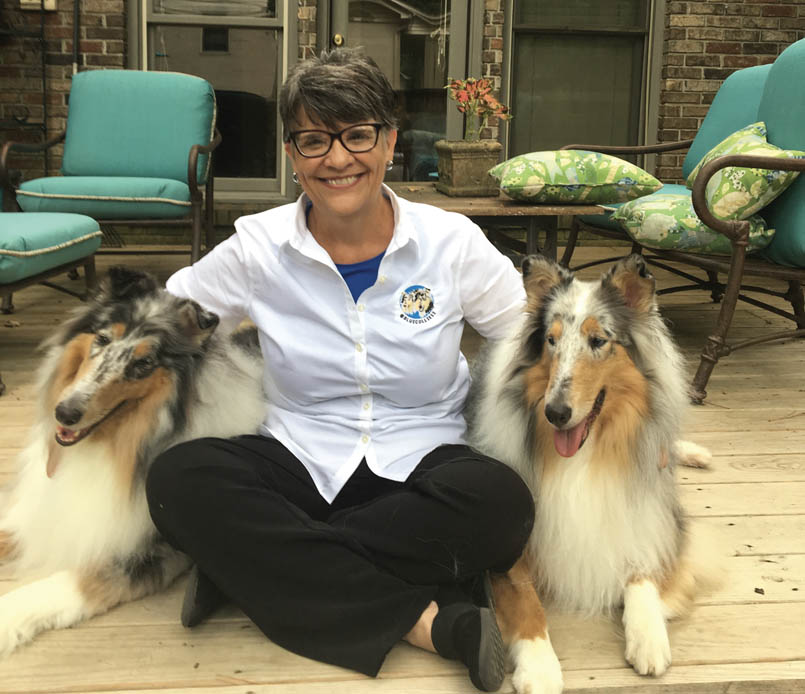16 Nov 2018 On stage or in crisis, Little Rock collies are always dynamic duo
Story and photo
by Dwain Hebda
When music professor Dr. Vicki Lind adopted her two collies, Caledonia “Cali” and Skye, turning them into multi-talented canines was the furthest thing from her mind. At first, it was a matter of whether or not she could keep them at all.
“As puppies, they were crazy,” she remembers. “I got both of them at the same time and Cali was 5 months old and Skye was 10 months old. I stayed at a hotel the first night and I thought about taking (Skye) back because I thought I just can’t handle this. They were big puppies and they would never stop playing with each other. And, they didn’t grow up together. They hadn’t been together as pups. It took a few months to get them where they were really good.”
It’s hard to imagine the scene now, as the two 4-year-olds follow every command that Lind, chair of the University of Arkansas at Little Rock Music Department, hands out. And it’s even harder to imagine when one considers the many adventures the duo has enjoyed, each requiring discipline and focus, not to mention considerable training.
“I do a lot with both of them,” Lind said. “They’re really fun to be around.”
Cali, with his laid-back personality and smooth demeanor, has proven a natural for helping people in crisis. He’s a certified therapy dog and just recently completed additional training with a therapy organization called Hope Crisis Response, for which he and Vicki completed four intensive days of training in Houston. The training is designed to acclimate dog and owner alike to the loud noises and human hysteria that frequently accompany a crisis.

“We were in classes eight hours a day with 15 other dogs,” she said. “We learned dog body language, signs of stress, how to deal with people in stressful situations. And the last day, we took all 15 dogs to a restaurant and sat there. It was amazing. The whole training was just phenomenal.”
Therapy dogs differ from service dogs in that therapy dogs are trained to provide comfort to humans in stressful situations, be it a hospital or a natural disaster. Service dogs, such as those that assist the blind, are meant to focus on performing functions for their human and thus petting and loving on these dogs by others is discouraged. For therapy dogs, the function is just the opposite.
“A therapy dog’s job is to make people happy, to make them feel comfortable,” said Lind, who noted Cali regularly works at Pinnacle Pointe Behavioral Hospital in Little Rock.
“At Pinnacle hospital, I love all the kids there, but the teenage boys in particular just melt my heart because they love Cali. They’ll get on the floor and hug him and play. Sometimes they want to do tricks. Most often they just want to hug him.”
Skye, on the other hand, has a little too much personality for therapy work in the strictest sense, but she can still invoke goodwill. Lind takes her to nursing homes to be a show-stopping Santa delivering cards and presents or where her vocal stylings are a crowd-pleaser.
“(Skye’s) noisy. She talks; she talks all the time. If she gets excited, she sounds like a pig, she grunts,” Lind said. “For therapy, that’s not great. So, she’ll be a performer, she won’t do the therapy stuff. But at home, I love it.”
Skye’s effervescence has come in handy in other pursuits. Lind has both dogs in training to become dancers and both appeared as “Sandy” in a stage version of “Annie” at the Wildwood Center for the Arts in Little Rock. A natural ham, Skye did some dancing in the production as well as some tricks.
“Collies are very smart dogs,” Lind said. “They will learn a trick in five minutes.”
Perhaps the greatest trick of all comes from the pups just being themselves, especially in Cali’s case, dealing as he does with people under duress, from serious illnesses to a program at the Little Rock airport that helps frazzled travelers.
Recently, Lind and Cali traveled to Marshall County, Ky., in the aftermath of a school shooting. The duo was among those stationed in the commons area where the violence had occurred.
“They stationed the Hope dogs on these big mushroom concrete benches and the kids would come by and just love on him,” Lind said. “There was a young man standing in the hallway just scowling. I thought, ‘Not a dog person. That’s OK.’”
“All of a sudden, he said, ‘I’ve not been able to touch these dogs, but I’m going to meet yours.’ He was one of the kids who had been shot, so he couldn’t make himself come back into the room. I said, ‘Since Cali’s your first one, he has a present for you.’ Cali has his own business cards and he takes it in his mouth and takes it to the boy, and the guy just lit up! Then he stayed and petted and played and stuff.”
“It was a moment that made a difference. That’s what the crisis response teams are all about.”










